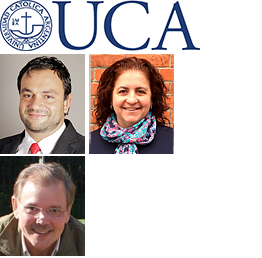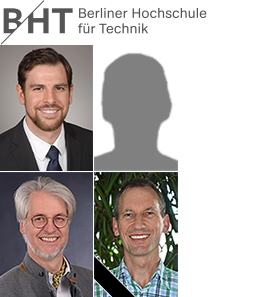
Who is Who
ARGENTINA: Pontificia Universidad Cátolica de Argentina (UCA), Buenos Aires - Facultad de Ingeniería y Ciencias Agrarias: Ingeniería Civil, Ingeniería Ambiental
- Projektleiter der UCA/ Director del proyecto UCA: Ing. Hernán Mariño
(2015-18: Mg. Gustavo A. del Pino) - Leitung Auslandsamt/ Directora Oficina Internacional (OI): Dra. María Verónica Muñoz
- Koordinatorin/ Coordinadora de Becas e Intercambio (OI): N.N.
- Website UCA Internacional
- calendario académico 2023

ALEMANIA: Berliner Hochschule für Technik (BHT), Universidad de Ciencias Aplicadas (antes: Beuth HS) - Depto. III: Bauingenieur- und Geoinformationswesen
- Projektleiter/ Director del proyecto de BHT: Prof. Dr.-Ing. Sebastian Pepper, Prof. Dr.-Ing. Stefan Heimann†; Prof. Andreas Heider (2015-23) z.Zt. beratend tätig
- Stellv. Projektleiter und -koordinator/ Director adjunto, coordinador: z.Zt. unbesetzt
- Leitung BHT International Office/ Directora Oficina Internacional: M.A. Olivia Key
- Incomings: Dipl.-Päd. Elena Kirschner; Outgoings: Dipl.-Soz. päd. C. Kleesiek
- Akadem. Kalender 2024/ 25
- webteam: Heider, Vigerske

DAHZ/ CUAA: Deutsch-Argentinisches Hochschulzentrum/ Centro Universitario Argentino-Alemán
- www.cuaa-dahz.org
Video about the foundation of DAHZ/ CUAA: https://youtu.be/Q1KbWKuge4k
Federal Ministry of Education and Research
Abstract

Both, BHT and UCA propose the I.DEAR project in the area of Civil-, Environmental Engineering and Renewal Energies enjoying a long track-record of mutual exchange collaboration within the "Global Engineering Education Program" (GE4) since 1996 as well as find common regional priorities of their official strategy of internationalization in Europe and Latin America respectively. Besides, both universities have adopted a comparable, practice- and service-oriented mission closely connected to the vital challenges of the "City of the Future" and, finally, both will define their I.DEAR venture as a contribution for implementing the City Partnership of Berlin and Buenos Aires.
The I.DEAR project will adopt a stepwise approach, first leading to intensify the mutual exchange of students and staff while abolishing all remaining institutional and/or curricular hindrances for the increase of mobility. In the second phase the partners work on establishing institutional structures for an integrated international study program in vision of a joint study and double degree course of BHT and UCA.
There will be compliance to guarantee full academic recognition and apply the instruments of ECTS including the commitments of the Lisbon Convention as well as improve their welcome structures and wave all tuitions. UCA and BHT also take an effort to stress the employability of graduates in both countries by specifically promoting practical (industrial internships), language and intercultural skills.
All project activities take synergetic measures for a sustainable perspective of the joint studies and exchange results, partly by initiating academic collaboration for joint research, transfer and development projects, partly by dissemination of results for curricular modernization (i.e. digitalization, distance and online learning models).



